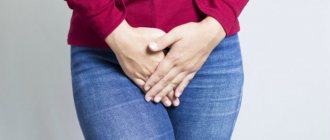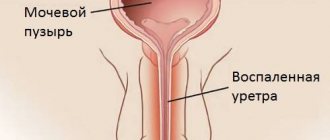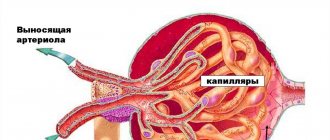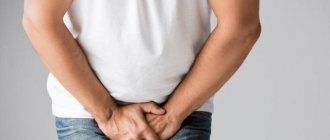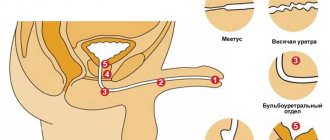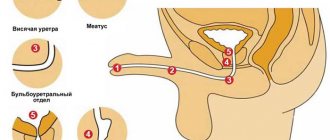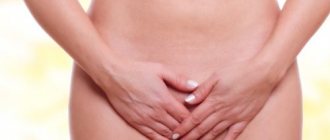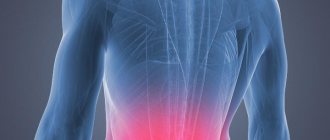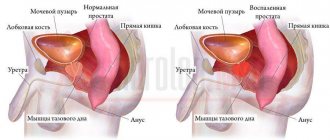Causes of discomfort after ejaculation
It is difficult to find a man who would indifferently accept the appearance of such a symptom as a burning sensation in the urethra after ejaculation.
Despite the fact that in some cases this may indicate only minor disorders in the body, the presence of serious diseases of the genitourinary organs cannot be excluded. Pain, as well as a burning sensation after ejaculation or a noticeable painful erection can occur under the influence of various factors, among which the following predominate:
- Prostatitis, i.e. inflammation of the prostate. With this disease, the acidity of the prostate juice may change, which in turn leads to irritation in the form of a burning sensation. Prostatitis can be infectious or non-infectious, therefore, treatment methods may vary depending on the type of disease.
- Inflammation of the glans penis (foreskin). This is balanitis or balanoposthitis, which manifests itself as rather unpleasant sensations after intimacy.
- Cystitis, or inflammation of the bladder. In this case, at the moment of ejaculation, quite severe pain is felt in the area of the entire urethra.
- Sexually transmitted diseases such as gonorrhea may also cause itching or burning during or after sex.
- Injuries to the frenulum (its rupture or tear) can be a consequence of too violent sex. They are accompanied by severe pain, and in some cases, the appearance of traces of blood or even bleeding.
- Squeezing or hitting the male genitals.
- Excessive sensitivity of the head of the penis.
- Varicocele, i.e. varicose veins of the testicles, in some cases may also be accompanied by pain during erection.
- Psychogenic pain syndrome - there are no objective reasons for the appearance of pain during ejaculation, but a man can feel unpleasant symptoms, being sure that he has some kind of disease. In this case, the help of a psychologist is necessary, but you must first undergo a full medical examination to ensure the patient’s health.
Since pain during an erection or after sexual intercourse can be a symptom of quite serious diseases, when it appears, it is highly advisable to undergo the necessary examination. To do this, you need to contact a urologist, who will prescribe tests to identify infectious diseases, as well as ultrasound of the genitourinary organs and other types of diagnostic measures.
During a conversation with patients, the doctor may ask additional questions about the location of pain and burning, the intensity of sensations, and the presence of other symptoms. All this will help to create an overall picture of the disease and, taking into account the analysis of examination results, establish the cause of the disease.
After determining the cause of the disease, it is necessary to begin choosing treatment methods. Depending on the nature of the disease, the doctor may recommend the following treatment methods:
- The use of antibiotics and other antibacterial agents when confirming the infectious nature of the disease.
- Treatment of the underlying disease that caused the unpleasant symptoms. So, if you have prostatitis, you must first fight this disease in order to prevent the situation from worsening.
- The use of special ointments to eliminate burning during ejaculation, itching and other painful sensations.
- Abstinence from intimate relations for some time in the presence of injury, damage or irritation to the male genitals.
- Seeking help from a psychologist or psychotherapist when identifying psychogenic erectile dysfunction.
You should not use antibacterial agents and other drugs on your own, since only in a medical facility can you perform the necessary tests and determine the name of the infectious agent.
During the treatment period, it is better to refuse intimate contact until the symptoms disappear completely or, as a last resort, use a condom.
If the penis hurts during erection, some problems may occur during sexual intercourse, for example, ejaculation too early. In this case, you can use special medications that can significantly prolong the time of intimacy.
Using Generic Dapoxetine allows you to increase sexual intercourse by approximately four times.
One of the advantages of the drug is that it can be combined with medications to quickly increase potency.
At the same time, it is absolutely not necessary to independently select combinations of drugs, because in the absence of medical education, an overdose can be allowed.
It is much safer and more effective to purchase a ready-made combination product with a two-in-one effect, such as Dapoxetine with Vardenafil. As a result, the man gets the opportunity to have prolonged sexual intercourse, surprising his partner with the strength of his erection.
The dosage of active ingredients in the presented product is selected in such a way as to provide the required effect of enhancing potency and prolonging the time of intimacy, without leading to the appearance of any undesirable symptoms from the cardiovascular or other systems of the male body.
These and other drugs are presented on our website. You can purchase them after first studying the description and availability of active ingredients.
These remedies can be used in cases where ejaculation has become premature for any reason - and this is not only inflammatory processes in the genital area, but also too rapid arousal due to inexperience in sex or excessive excitement. Thanks to the use of combined drugs, a man may not worry at all about any failures during intimacy, as a result of which his self-esteem and self-confidence increase.
The nature of pain during ejaculation can be different. It can occur at the moment of ejaculation itself or after it, and can be sharp, aching or acute. Discomfortable sensations do not always appear as a signal of problems in the body.
Often, couples use a method such as coitus interruptus to prevent unwanted pregnancy. This approach to contraception causes disturbances in the functioning of the male reproductive system. The pain syndrome goes away immediately after changing the method of contraception.
Burning
A burning sensation in the urethra after ejaculation can be accompanied by various symptoms. Their characteristics depend on the cause.
For example, with candidiasis the following symptoms may be observed:
- The appearance of a white coating on the male genital organ.
- Pain syndrome after ejaculation.
- Pain and sting when urinating.
- The head of the penis begins to itch.
Discomfort
Epididymitis, orchitis and other inflammatory processes in the testicles can cause pain. They appear not only in the urethra, but also in the sacrum and groin. In this case, the scrotum increases in size and swelling is observed.
Discomfort, burning or pain during or after ejaculation indicate a malfunction of the genitourinary system.
The causes of such alarming symptoms include:
- urolithiasis disease;
- varicocele;
- adnexal cysts;
- hydrocele;
- neoplasm in the testicle or prostate;
- Peyronie's disease;
- phimosis
A man’s psychological attitude plays an important role in normal sexual intercourse and painless ejaculation. According to experts, pain at the end of intimacy is often psychogenic in nature.
Factors that can cause the disorder include:
- Psychosomatic diseases.
- Neurogenic disorders.
- Fear of an unplanned pregnancy.
Inflammatory diseases of the reproductive system are another common cause of discomfort. They can be caused by infections, disorders and circulatory disorders in the pelvic organs. The inflammatory process can occur in different places. In this case, the pain intensifies at the time of ejaculation.
Diseases that cause pain in the prostate after ejaculation:
- prostatitis;
- cystitis;
- vesiculitis;
- urethritis;
- orchiepididymitis;
- colliculitis.
Prolonged arousal, medication, and genital trauma can also be factors in pain.
How to eliminate painful discomfort when urinating?
When it hurts to go to the toilet after sexual intercourse, this is not normal. So the male body indicates a failure that requires adequate treatment. Under no circumstances should we endure and hope that the situation will soon normalize on its own. Of course, there is a chance that the body will cope without medical help, but it is negligible. There is a higher chance that the disease will transform into a chronic form, as a result of which treatment will take months, if not years.
Medications
Conservative treatment is prescribed individually. The treatment regimen is drawn up taking into account the cause of the disease. Most often, treatment is complex and includes medications, physiotherapeutic procedures, prostate massage, etc.
If chlamydia provokes pain in a man, then antibacterial treatment is recommended. Antibiotics from the group of macrolides, tetracyclines, and fluoroquinolones are prescribed. The most effective medications include:
Appointment with a urologist: preparation for examination, diagnosis and treatment measures
- Doxycycline;
- Azithromycin;
- Ofloxacin.
For your information, for mild to moderate chlamydia, the use of one antibiotic is sufficient. If an advanced stage is diagnosed, then 2 antibiotics + an antifungal drug are prescribed - its necessity is due to the fact that antibacterial therapy destroys normal microflora.
Treatment depending on the cause of pain when urinating after sex:
- If the patient has gonorrhea, antibacterial treatment is carried out. Prescribed medications - Cefixime, Ciprofloxacin.
- Trichomoniasis is treated with medications that belong to the pharmacological group nitroimidazoles. This is Tinidazole, Ornidazole.
- For urethritis, therapy is carried out with antibiotics - Tsiprinol, Amoxiclav.
- Treatment of prostatitis depends on the cause. Against the background of bacterial inflammation, antibiotics are recommended.
Additionally, anti-inflammatory drugs are included in the treatment regimen - they stop the inflammatory process; Painkillers are recommended for severe pain. To strengthen the immune status and barrier functions of the body, vitamin and mineral complexes, immunostimulants and immunomodulators are prescribed.
Help from traditional medicine
Whenever it hurts to pee after sex, the cause is an inflammatory process. Traditional medicine offers recipes that have an anti-inflammatory effect. They will not cure the patient, but they help alleviate negative symptoms. Folk remedies are combined with drug treatment. To avoid complications, you should consult your doctor.
Non-traditional treatment methods:
- Linden infusion helps with urethritis. You need to steam two tablespoons of flowers in 500 ml of hot water and leave. Take 250 ml at a time just before bed. The duration of treatment is 10 days. Pure cranberry juice helps relieve pain;
- For urolithiasis, a decoction based on potato peelings is used. Wash about 200 g of peelings and add water so that the liquid completely covers the component. Cook over low heat for 40 minutes. Filter. Take 50 ml three times a day. Treatment lasts a week;
- Garlic infusion helps with sexually transmitted diseases. Chop 5-7 cloves of garlic using a knife, add 300 ml of water. Leave in a dark place for two days. Take 25 ml before meals. Frequency – 4-5 times a day. The product stops the inflammatory process and slightly dulls the pain;
- For prostatitis, prepare a decoction based on arnica. Two tablespoons of a medicinal plant are poured into a liter of water. Leave for an hour. Drink as regular tea throughout the day. You need to treat like this for a week.
Advice: if the cause of pain when urinating after intercourse is prostatitis, then a microenema with tansy and chamomile helps reduce inflammation. Add 1 tbsp to 250 ml of hot water. dried ingredients, leave for 15 minutes, strain with gauze. Inject into the rectum, try to retain the liquid for 20 minutes. Manipulation is carried out once a day for 7-10 days.
The occurrence of pain after intercourse in men is due to various reasons, which can only be determined by a medical specialist. During the treatment course, it is recommended to have sexual rest, maintain a drinking regime - 2 liters of clean liquid per day, and a balanced diet. When diagnosing a sexually transmitted disease, the partner must be examined and treated.
Why do you feel pain and burning?
Often a person experiences discomfort during sex and after the next ejaculation. Then the man begins to worry about the question: why did this condition arise? One of the causes of discomfort may be the partner’s interruption of sexual contact in order to avoid unwanted conception of a child. This leads to a malfunction of the organs of the reproductive system.
Another factor provoking discomfort may be psychogenic pain syndrome. In this case, there are no serious circumstances causing pain and burning. If a man is sure that he has any disease, he can feel them. In this case, you will need the help of a psychologist and a medical examination.
Pain during semen discharge and after ejaculation may be a sign of frenulum injury due to violent sex. In this case, discomfort is accompanied by traces of blood. Also, the reason for burning and pain is long-term use of antibiotics and incorrectly chosen methods of contraception.
Causes
Unpleasant sensations in the form of itching and burning can occur due to a number of associated factors.
Thrush (candidiasis)
Pathogenic fungi Candida become the culprits of the disease. Women often get sick; the vagina provides suitable conditions for microorganisms to reproduce.
But men are also exposed to this condition, for example, after experiencing stress, hypothermia, a malfunction in the immune system, infection from an infected partner occurs easily.
It is transmitted not only through sex, but also through close contact with a patient, through kissing, if candidiasis has affected the oral cavity. Symptoms: itching, burning during PA in the urethra after ejaculation, white coating on the penis and cheesy discharge.
Trichomoniasis
A common sexually transmitted disease that affects the urethra and prostate. The route of transmission is sexual, rarely through hygiene and household items.
Clinical picture: burning after urination, sex, itching, unpleasant purulent mucous discharge from the urethral canal. This fact cannot be ignored; it carries the risk of developing prostatitis, and often infertility.
Gonorrhea (hussar disease)
A sexually transmitted disease is caused by damage to the urethra, intestines, throat and eyes. The route of transmission is sex.
Signs: discomfort, itching, burning in the urethra, which becomes more intense when urinating, purulent discharge when pressing on the head of the penis in the first days after infection, then constantly.
The smell of rotten fish. Frequent urge to urinate. The chronic form of the disease develops a number of consequences, affecting the prostate gland and testicles, which often leads to infertility, impotence and adenoma.
Balanoposthitis
The inflammatory process of the foreskin and glans bothers a man with a burning sensation during urination and ejaculation. The cause of this condition is bacteria and fungi, which actively develop when the genital organs are not properly cared for.
Lack of hygiene is the main factor of the disease. Symptoms: swelling, dryness, cracks on the head, white discharge from the canal, burning, pain during and after sex.
Burning after intercourse
Pathologies of the testes can cause discomfort. This could be torsion of the right or left testicle, inguinal hernia, or varicocele. The inflammatory process causes pain during orgasm due to increased blood flow to the genitals. Unpleasant ejaculation can be a symptom of vesiculitis, orchitis, balanitis.
Inflammation of the prostate gland often causes a burning sensation and pain during ejaculation. It can be caused by viruses, fungi and infections, as well as various diseases. With this pathology, pain radiates to other organs, and discharge is observed from the urethra. If you don't seek help, your problems will get worse.
Pain and irritation during ejaculation may be signs of inflammation in the bladder and urethra. This happens because the scars formed on the surface of the urethra experience tension, and microcracks form. When seminal fluid enters them, the man feels a cutting pain and itching, and a burning sensation in the urethra is observed during urination.
Among such diseases one can distinguish urolithiasis. Its peculiarity is an increase in the number of urges to go to the toilet after physical activity or long walking. Cystitis is also characterized by pain when going to the toilet. Pain syndrome often occurs against the background of orchiepididymitis. This is the name for inflammation in the testicle or appendages.
During sexual intercourse, the wife's secreted lubricant changed in composition (the color and consistency remained unchanged) and began to cause a burning sensation, especially towards the end of sexual intercourse. There are no other symptoms or changes. The feeling of need for intimacy remains, but the fear of burning and irritation is annoying. Help us understand what is happening to us? How to deal with these?
Hello.
I’m very interested in how you found out that the lubricant secreted by your wife has changed in composition; if neither the color nor consistency has changed, did you have it analyzed? Besides, why do you think that it was the lubricant that caused your burning sensation?
In most cases, the appearance of a burning sensation in a man after or during sexual intercourse may have nothing to do with the woman, but be caused by infectious and inflammatory diseases of the prostate gland, bladder, and so on.
An infection in a man’s genitourinary organs can enter either through the urethra by an ascending flow, or brought from another organ through the bloodstream, and can also be a consequence of insufficient hygiene of the penis.
In case of infectious and inflammatory diseases of the penis, tissue scarring can occur, which leads to excessive tension during sexual intercourse, the appearance of microcracks, and, consequently, cause a burning sensation, which is especially pronounced during intense frictions. When you have cystitis, at the time of ejaculation, severe burning pain occurs on the penis in the area of the urethra. However, with cystitis, pain also occurs when urinating.
With various sexually transmitted diseases, for example, gonorrhea, acute burning pain and a burning sensation in the penis may occur during or after sexual intercourse.
A man may also develop painful sexual intercourse syndrome, when acute or burning pain occurs during sexual intercourse or after its completion.
Of course, in most cases, a burning sensation occurs due to urinary tract infections.
So, burning after urination, ejaculation, discharge from the urethra, inflammatory processes in the prostate gland can be characteristic symptoms of ureplasmosis and mycoplasmosis
The appearance of burning, itching in the area of the foreskin and glans penis, the appearance of pain during sexual intercourse and urination, the appearance of a white coating on the penis are symptoms of candidiasis, or in common parlance, thrush.
Why does pain occur during or after ejaculation?
From the epididymis, sperm rises to the prostate gland, where it enriches its composition, and only after that it is released into the urethra.
Pain during ejaculation can occur due to irritation of any area involved in this process: testicles, vesicles (seminal vesicles), seminal tubercle, prostate, urethra, vas deferens.
The approximate cause of discomfort can be determined by its location and accompanying symptoms . But pain during ejaculation may indicate the development of a serious pathology, so delaying professional diagnosis in this case is dangerous.
BPH
Adenoma usually occurs in men after 50 years of age . With this pathology, there is a gradual proliferation of glandular tissue around the prostatic part of the urethra and its compression . As a result, the outflow of urine and the movement of sperm are hampered, and the blood supply and innervation of the penis are disrupted.
With adenoma, a man may feel pain in the perineum not only during ejaculation, but also during sexual intercourse . Similar symptoms usually appear in the second (subcompensated) stage. The nature of the pain depends on the volume and direction of tissue growth (hyperplasia).
Inflammation of the testicles
If ejaculation is accompanied by sharp pain not only in the perineum, but also in the left or right testicle, then the cause is most likely orchitis or epididymitis - inflammation of the testicle or its epididymis. Orchitis is manifested by the following symptoms:
- Low temperature, chills. Often there is a headache and nausea;
- Enlargement of the scrotum (usually unilateral);
- The testicle pulls during bowel movements, and it also becomes painful when palpated, while squatting or walking.
The last group of symptoms (along with pain during ejaculation) is the only manifestation of the chronic form of orchitis. Such signs are a reason to immediately consult a doctor, since inflammation can lead to atrophy of testicular tissue and infertility.
Epididymitis symptoms differ little from orchitis. Inflammation of the epididymis also causes pain during ejaculation, which can radiate from the testicles throughout the groin and even to the lower back . Pathology can be distinguished by the location of the tumor.
When you feel the testicle, it is not the testicle itself that is enlarged, but the formation that frames it on top - the appendage. Doctors easily diagnose this pathology by palpation.
Epididymitis rarely occurs in isolation, so after a few days there is a high risk of infection of the tissues of the testicles (orchiepididymitis), spermatic cords, and urethra.
Sexual infections
The presence of sexually transmitted infections is usually indicated by itching in the urethra, in the head, its redness and swelling, as well as discharge from the urethra.
In some cases, the disease can be hidden, sometimes worsening in the form of pain during ejaculation or urination. If left untreated for a long time, pathogens spread throughout the genitourinary system.
Some of them (chlamydia) are found throughout the body.
To enlarge, click on the image
Coitus interruptus
Interrupted sexual intercourse and deliberately delaying it, as well as “dry” orgasm are methods that can lead to pain during ejaculation.
Violation of the physiological process of sperm release causes overstrain of the muscles of the ducts and prostate. The pain in this case is dull, without cutting, gradually passing .
There is no specific localization, it radiates from the anus and navel.
Uncommon causes
In some men, pain during ejaculation occurs as a result of instrumental urological examinations . Even a simple smear from the urethra can provoke an inflammatory reaction, which will manifest itself when irritated by ejaculate or urine.
In some cases, pain during ejaculation can be caused by increased sensitivity of the head, phimosis, or psychogenic causes . In the latter case, the discomfort is idiopathic in nature, since it is caused not by pathology, but by a violation of the normal perception of sexual intercourse.
The cause of pain during ejaculation may be obstruction of the vas deferens (loss of their patency). Pathology is provoked by the following factors:
- Epididymitis.
- Mechanical damage to the duct during operations.
- Taking medications that affect the contractile function of the ducts or seminal vesicles.
The exact cause of painful ejaculation can only be determined through diagnostics.
Treatment and prevention
Treatment is prescribed based on diagnostic results. Infectious processes, which are most often the cause of ejaculatory pain, are stopped with the help of individually selected antibiotics.
The complex of therapy also includes anti-inflammatory, analgesic, laxatives and blood thinners, and urethral instillations.
Some pathologies (for example, duct obstruction and adenoma) require surgical intervention performed using minimally invasive methods. Physiotherapy is widely used to treat prostatitis.
As for the prevention of pain during ejaculation, in most cases the simplest and most effective measure is protected sexual intercourse (with a condom):
- A man does not need to worry about his partner’s unwanted pregnancy;
- There is no unnecessary tension in the genitals;
- Sperm comes out, renewing the contents of the gonads;
- The penetration of infections is excluded.
You should not unnecessarily prolong sexual intercourse by holding back ejaculation. The ancient Taoist teachers warned about the consequences of improper stopping of sperm in the form of pain in the lower abdomen on the pages of their treatises.
Venereal diseases
These include chlamydia, gonorrhea, syphilis, ureaplasmosis and some other infectious diseases. A harmful microbe entering the body causes disturbances in the functioning of the urinary tract. This often manifests itself in the form of itching and burning that occurs during ejaculation, as well as after visiting the toilet.
Increased body temperature
Additional signs of sexually transmitted diseases include increased body temperature, a headache, and discharge when urinating in men. Signs of candidiasis are pain during ejaculation, as well as a white coating on the penis.
The main causes of pathology
So why do some representatives of the stronger sex experience pain after ejaculation? This pathology often appears due to non-compliance with personal hygiene rules and urethritis (inflammation of the urethra).
If a man has a chronic or infectious disease, scar tissue gradually forms in the genital area. It stretches during intimacy. Because of this, a man often develops small cracks, which is why a burning sensation occurs after ejaculation.
Cystitis may also be the cause of this phenomenon. When the bladder becomes inflamed, the patient experiences severe pain in the area of the urethra. People suffering from cystitis also experience a burning sensation when urinating.
If you have any sexually transmitted disease, cutting pains also appear both during intimacy and after completion of sexual intercourse.
The patient's body temperature often rises and he complains of headaches.
Diagnostics
To get rid of pain and burning during orgasm, treatment should be aimed at eliminating the underlying disease that caused these symptoms. It is impossible to independently diagnose and prescribe therapy. You should immediately visit a urologist.
At the initial appointment, the doctor asks various questions about the nature of pain and burning during ejaculation, the strength of sensations, and other symptoms. The doctor may prescribe a general urine test, ultrasound of organs, smear tests for sexually transmitted infections, urethral scraping, and examination of prostate secretions. Once the diagnosis is established, treatment is prescribed.
Ointments for pain and itching
- Ointments. They eliminate burning, itching and pain during orgasm.
- Antibiotics and herbal preparations. Taking antibacterial and anti-inflammatory drugs is aimed at eliminating the symptoms of various diseases.
- Electrical stimulation. Against prostatitis, a procedure is performed to relieve inflammation from soft tissues.
If the problem is related to sexually transmitted diseases, the partner is treated. Some advanced pathologies require surgical intervention.
During the treatment period, you need to give up intimate relationships, especially if there are injuries to the penis and scrotum. In other cases, it is necessary to use a condom as a means of protection. Sometimes the patient is prescribed a consultation with a psychologist or psychotherapist.
When visiting a specialist, it is necessary to take a swab from the urethra, because burning can be caused by dangerous bacteria.
Before taking the test, you must follow some preparation rules:
- Abstinence from alcoholic beverages.
- Maintaining sexual rest.
- Avoiding the use of antibacterial personal hygiene products.
At the moment of intimacy, some of the harmful bacteria leave the body. Therefore, sexual abstinence is important for the required amount of study material. Before the examination, it is recommended not to have sex for 4-6 days.
Antibacterial detergents effectively kill microorganisms. You need to switch to other hygiene products one day before handing over the material. Alcohol has a strong effect on the flora of the urethra. If you abuse alcohol, some bacteria may develop into cysts or die. You should stop using it 5 days before the smear.
Why does frequent urination occur after sex and how to treat it
Women are more predisposed to cystitis than men, due to the specific structure of the genitourinary systems of different sexes.
Why is post-sex incontinence more common in women?
The female reproductive system is located too close to the excretory system and, at the same time, during the act of copulation, it does not in any way close the genital opening to prevent the entry of harmful bacteria. In men, the structure of the penis is such that when aroused, the urethra, that is, the main urinary canal, is compressed by activated muscles. But the hole for urine discharge in women is not protected in any way from infections getting into it. In particular, during sex, pathogens from feces or from the surface of the vagina can easily enter an unprotected opening and cause the development of cystitis.
Prevention
In order to avoid discomfort during sexual intercourse, it is recommended to follow some rules:
- Proper nutrition.
- Personal hygiene.
- Protection during sexual intercourse.
- Using underwear made from natural materials.
Personal hygiene must be carried out regularly. The products used for shaving hair and washing the body must be individual. Briefs should be chosen with a loose fit. It is recommended to give preference to natural fabrics. When using synthetic materials, the groin area will sweat a lot. A condom will help protect the body during sex from sexually transmitted infections and other diseases.
Preventive measures for burning and pain during ejaculation are focused on a healthy lifestyle. First of all, it is recommended to maintain intimate hygiene.
The genitals are susceptible to various infections. Remains of urine, seminal fluid, smegma, etc.
, create a favorable environment for the proliferation of pathogenic microorganisms. A timely shower can protect you from many negative consequences.
As a preventative measure, it is necessary to wear underwear made from natural fabrics. When using synthetic materials, the skin suffers from oxygen deficiency, sweating increases, which creates a favorable environment for microbes. This factor should be taken into account at any time of the year. It is better to choose loose-fitting panties and avoid excessively tight swimming trunks.
The etiology of pain during ejaculation can be different: from a sharp decrease in immunity to sexually transmitted diseases. If you have any warning signs, you should visit a urologist. Timely treatment allows the pathology to be diagnosed at an early stage, which prevents possible complications.
The occurrence of pyelonephritis
Inflammation of the kidney structures occurs due to pathological bacterial microflora. When diagnosed, Klebsiella is detected, which is common among the provoking factors of pathologies in the renal structures.
There are a number of factors influencing the occurrence of the process:
- Infections in the urinary organs.
- Escherichia coli is a provoking factor in 80% of cases.
- Pathogenic microorganisms – Klebsiella, Enterobacteriaceae, Proteus, Citrobacter, Staphylococcus aureus.
- Infectious lesions of a fungal nature are susceptible to people with diabetes and a weak immune system.
- Varieties of salmonellosis, mycoplasmosis and chlamydia.
Secondary factors that provoked the occurrence of pyelonephritis will be:
- Diseases that provoke stagnation of urine in the urinary system. Then microorganisms begin to develop, causing infectious lesions.
- Diseases that weaken the body's immune system.
- The presence in the urethral tract of objects foreign to the body - catheters, urine receivers, which make the process of development of microorganisms rapid and contribute to the spread of microorganisms of a pathogenic nature.
Other factors may influence the normal excretion of urine from the kidneys:
- improper development of the urinary system organs;
- oncological tumors in the urinary system, malignant formations in the intestines, uterine layers, in the prostate gland of men;
- damage to the urethral tract during surgery, treatment with radiation;
- path injury;
- formation of multiple cysts in the renal structures;
- the presence of stones in the kidneys and urinary system;
- ailments associated with neurology;
- chemical therapy;
- diabetes.
What needs to be treated first?
In their opinion, most experts agree that the disease that occurs in a more acute form is the first to be treated. Moreover, such tactics are valid only in case of complications of prostatitis by some disease of the urinary system.
It is noteworthy that in some cases the treatment tactics for prostatitis and some diseases of the urinary system are the same. In particular, to eliminate infections in prostatitis and diseases of the urinary system, antibiotics (often of the same group), uroseptics and physiotherapy are used.
Therefore, if treatment tactics are developed by an experienced specialist, then it can be effective for both diseases, and also reduces the drug burden on the body. As you can see, there are many reasons why the kidneys hurt with prostatitis; it is impossible to independently differentiate one disease of the urinary system from another, much less get rid of the problem.
Treatment of kidney pain
The right treatment option for alcohol-related kidney pain depends on the cause.
Here are some treatment options:
- antibiotics to treat UTIs
- painkiller
- electrolytes or intravenous fluids to control dehydration
- short-term dialysis to remove accumulated toxins in acute kidney injury
- Diet and lifestyle changes to treat chronic kidney disease
- medications to lower blood pressure and treat other symptoms
- long-term dialysis for kidney support
- kidney transplant
Symptoms
The clinical picture characteristic of pyelonephritis is formed when a number of specific and general symptoms occur, depending on the form of the inflammatory process.
In acute pyelonephritis, the predominant symptoms are:
- pain syndrome with pronounced intensity of pain;
- dysuric phenomena - disturbance of the act of urination;
- discharge from the external opening of the urethra, the nature can be varied - from transparent mucous to purulent;
- intoxication syndrome, which is manifested by high febrile body temperature, chills and a strong feeling of weakness and aches throughout the body;
- edema syndrome, with a decrease in glomerular filtration rate and the development of chronic renal failure.
In chronic pyelonephritis, the symptoms will not be the same, but the severity is less than in the case of the acute form.
More often, in the presence of a chronic form in remission, patients note discomfort in the lumbar region and may even attribute the symptoms to a pathology of the musculoskeletal system or a neurological problem, which makes further detection of the disease and timely treatment difficult.
Why do prostate problems affect kidney function?
The most common cause of prostatitis is infection (fungi, bacteria, STIs, viruses, microbes). Migration of infection along the ascending path to the kidneys can provoke the development of dangerous diseases (pyelonephritis, renal failure, urolithiasis and others).
In some cases, migration of infection along the urinary tract occurs against the background of acute or partial urinary retention. Most often this happens with advanced chronic prostatitis or prostatic hyperplasia, when the prostate completely or partially compresses the urethral canal due to its enlargement and inflammation.
